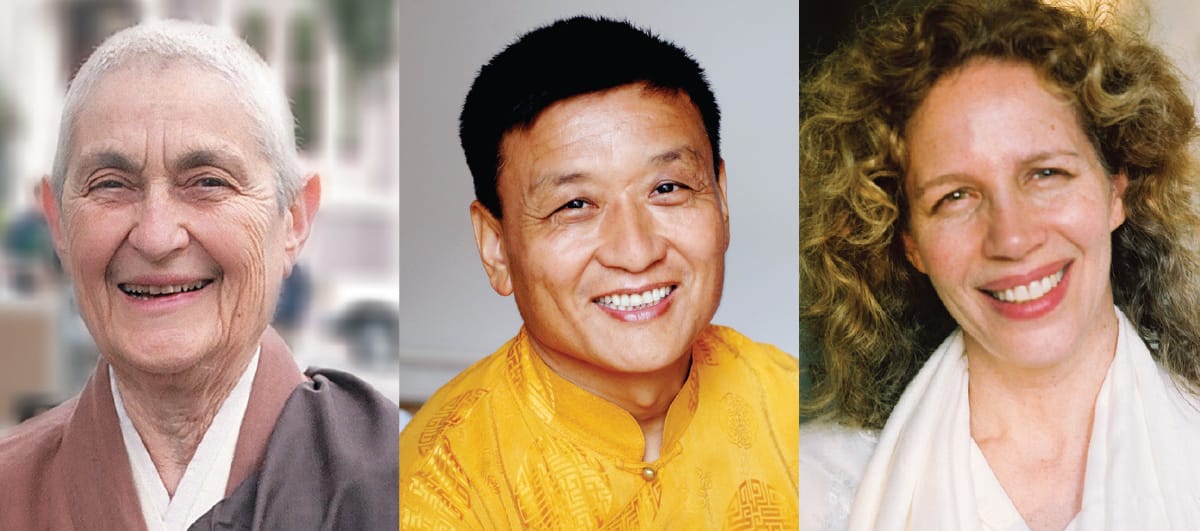Question: Why is the cruel treatment of animals almost never discussed or questioned within Buddhist circles or Buddhist magazines? So many Buddhists continue eating meat and wearing leather and fur. I don’t understand this. What is your view, and how can we who live by the dharma bring about a change?
Zenkei Blanche Hartman: My view is that we are most effective in bringing about change in the world around us by the example of how we live our own lives. The most convincing argument for treating all beings with kindness and compassion is encountering someone who is doing that wholeheartedly. We feel the effect of their kindness and compassion and also observe that a person who lives like that is generally happy and grateful, as well as kind.
Your question here in Buddhadharma will encourage dharma practitioners to think about whether the way we are living is kind to all beings, not only humans. For example, as I was about to say that I never see dharma friends wearing leather or fur, except for shoes, I began to consider whether I might be able to find suitable footwear that is not made of leather. So I think it is useful to raise the question so that we may all be more thoughtful in the choices we make. However, we also need to be careful not to fall into the painful state of mind that accompanies being judgmental or critical of others.
While most dharma groups in the United States that I’m familiar with serve only vegetarian foods, it is important for you to realize that there are traditional Buddhist cultures at high altitudes or high latitudes where the climate is not appropriate for a human population to survive solely on the plant foods that grow there. Those cultures have developed in dependence on foods from animal sources.
The most relevant concern, for me, is the inhumane treatment of animals in the commercial mass production of animal foods. I therefore choose to eat a mostly vegan diet, except for some yogurt and cottage cheese and occasionally some fish. I also support People for the Ethical Treatment of Animals in their effort to help people become more aware of the need for more humane treatment of animals grown for food.
Geshe Tenzin Wangyal Rinpoche: Among a monk’s vows is the vow to not eat meat, but often Tibetan monks did not strictly adhere to this vow. Living in the mountainous regions of Tibet at high altitudes, roasted barley, meat, and dairy products were the only food sources. If you could not eat meat, your diet was meager; therefore people developed the habit of relying upon meat for survival.
Tibetans are very careful not to harm or kill a mouse, a mosquito, or any living being. They are quite aware of preserving and protecting the lives of other beings. But as far as food and survival are concerned, meat has historically been an essential food source. Because of this, many prayers are said on behalf of the animals that are killed for food, and while alive, the animals are treated with respect. Once they are dead, mantras are carved on their bones, which are then put in high places.
According to tantric practices, the tantric practitioner is supposed to eat meat, to transcend the mind that categorizes what is to be accepted and what is to be rejected. However, that does not mean that one does not have compassion for all beings and pray for their liberation from the suffering of cyclic existence.
When many Tibetan exiles came to India and Nepal, there were more food choices available, but the habit of eating meat remained. It is a cultural pattern. In my upbringing in the monastery in India, I was vegetarian mostly due to poverty. Upon leaving the monastery, I often ate meat.
Currently there is an educational movement underway within the Tibetan refugee populations of Nepal and Tibet that conveys, through video and discussion, the cruel treatment of animals in the meat industry. This is leading to a change among the younger generations of Tibetans who are choosing to break the cultural pattern and become vegetarians. Through the influence of this information, and since I live in the West where there are abundant food choices, I now choose to eat as a vegetarian.
As far as my students are concerned, while I may gradually encourage them to consider becoming vegetarians, I don’t want to judge them. I believe that through personal reflection, one should develop one’s own motivation to change a habit.
Narayan Helen Liebenson: My view is that vegetarianism is surely best. It is common knowledge that animals raised for consumption are mistreated and that they experience pain when they are killed. If we resonate with the pain that animals clearly feel, it seems to me it’s very difficult to justify using animals to satisfy our own desires. As far as I know, most Theravada meditation centers in the West are vegetarian for this reason. Eliminating or at least minimizing one’s consumption of meat is an expression of compassion. It’s also very positive from the point of view of global warming. According to a recent United Nations report, the meat industry is responsible for twenty percent of the world’s carbon emissions.
Yet the answer to your question is not simple. Some people need to eat meat for their health. His Holiness the Dalai Lama is one of these people. He has written that his strong preference is to refrain from eating meat but that his doctors have advised against it. It is clear that this pains him. As well, there are certain parts of the world where meat must be eaten simply to survive.
Theravada monks are in a different position than laypeople because monks have little choice about what they eat. Monks are dependent on laypeople for their food and are expected to accept whatever is offered. As I understand it, the higher precept that monks are expected to keep is the precept of accepting whatever is offered to them. They also need to avoid being directly responsible for an animal being killed expressly for them.
I do think if we choose to refrain from eating meat that it is wise not to be dogmatic or self-righteous about it. As we know, history is full of people who were remarkably cruel to other people and yet were kind to animals. Ultimately you must do what is right for you. If you choose not to eat meat or wear fur or leather, your example may inspire others. There is so much suffering in this world and there are so many ways that we can try to alleviate it. Anything we do to alleviate the suffering of others, including animals, is beneficial.




